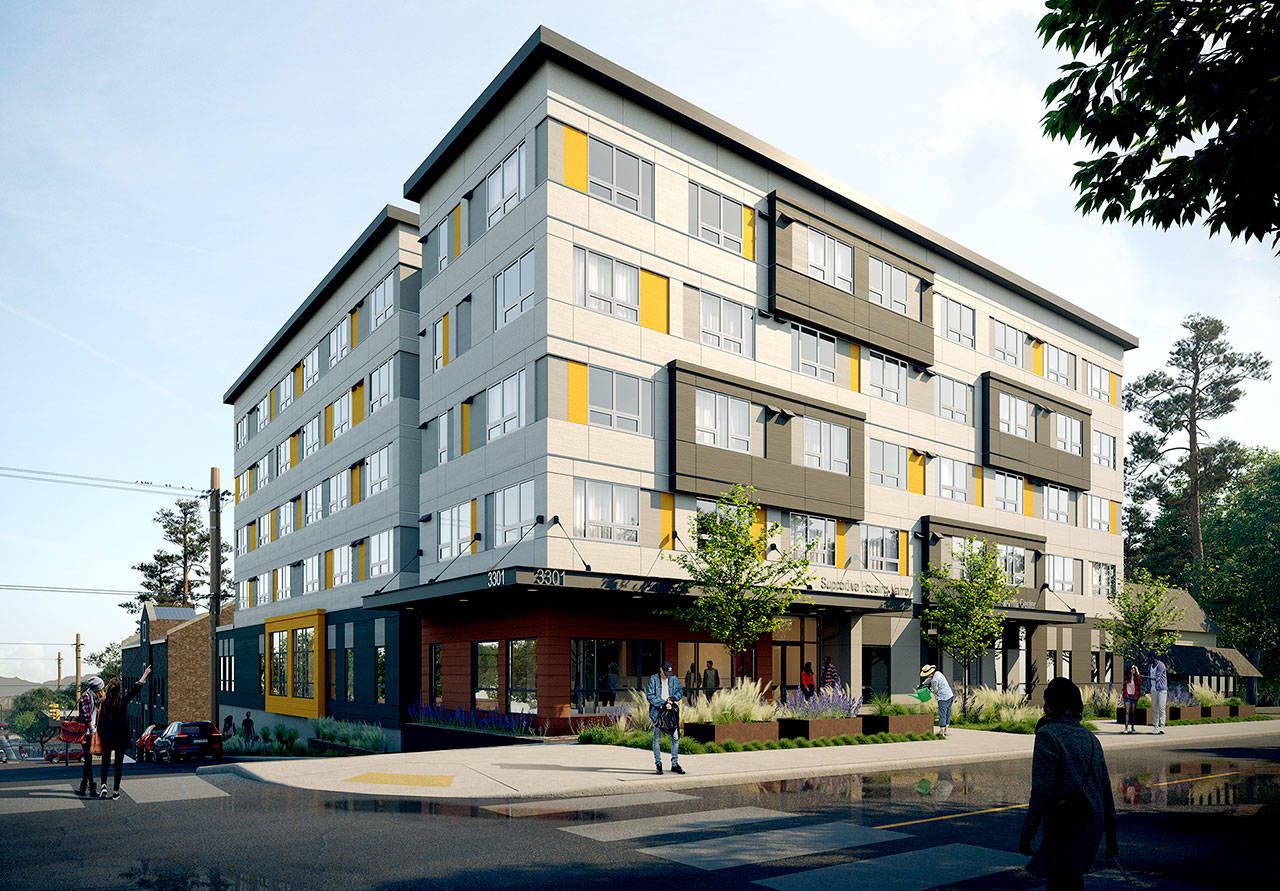EVERETT — From outside, it will look like any other new apartment building around town.
Inside, city, county and state leaders, along with mental health professionals, hope 82 units of permanent supportive housing will positively transform lives.
Compass Health, a behavioral and mental health care provider based in Everett, is set to break ground Friday for the five-story, 47,000-square-foot building on Broadway.
The $26 million development should open by spring 2021.
Compass Health owns about 175 supportive housing units throughout five counties. The new building will double its units in Snohomish County.
“When we think about whole-person health for our community members at the lowest economic rung, living at the poverty level, we know that good, decent, affordable housing is a critical component of their recovery process, as important as anything else we do for them clinically or therapeutically,” Compass Health CEO Tom Sebastian said.
Snohomish County’s annual Point-in-Time Count, a snapshot of homelessness, tallied 1,116 people last year.
The supportive housing units are funded through government and private financing, including donations to a capital campaign.
Gov. Jay Inslee, Rep. Rick Larsen and Everett Mayor Cassie Franklin were scheduled to join the celebration.
“Too many Washingtonians are homeless and in need of stable housing right now,” Inslee said in an emailed statement. “We should celebrate Compass Health’s plans to provide more than 80 units of permanent supportive housing in Everett. I’m proud of the state’s investment in this project and investments throughout the state to support behavioral health and address homelessness.”
In 2019, 150 supportive housing units opened in Everett: Clare’s Place in the Glacier View neighborhood off Berkshire Drive, Housing Hope’s Hopeworks Station II on Broadway and Cocoon House on Colby Avenue.
They’re all full, and the need remains.
“This project is going to provide some much-needed supportive housing,” Everett planning director Allen Giffen said.
Of the 82 units, 61 will be for people who are chronically homeless and 20 are for households at high risk of homelessness. One unit will be a transitional three-room apartment for people discharged from Western State Hospital.
Snohomish County’s coordinated entry system selects residents through a needs-based application process.
As part of the housing-first or low-barrier model, residents are taken as they are, without requirements related to sobriety.
Substance use disorder and addiction are mental health issues that are difficult enough to treat. A lack of stable housing adds another layer of complexity.
“How’s it worked in the past for us to say, ‘Nope. We’re not going to help you. Get your act together, and then we’ll give you a place to work?’” he said. “It’s been a failure.”
The facility will have space for mental health treatment, peer support, homeless outreach and housing stabilization. Those services will occupy the 10,000-square-foot ground floor.
Residents are likely to have “complex medical needs” and will be offered treatment and assistance programs with round-the-clock staffing, Sebastian said.
Compass Health wants 10 onsite employees, eight during the day with two at night. But that’s dependent on funding through a mix of rental vouchers and capital campaign donations.
“This is a lot less expensive than what we’re doing today,” Sebastian said, referring to the added expense on the health care and law and justice systems that can accrue when people in crisis are arrested rather than treated.
The building will be on the corner of 33rd Street and Lombard Avenue, across from single-family homes. Because of the proximity to houses, landscape enhancements along Lombard were included at the supportive housing facility, Giffen said.
“Anytime there’s a building project in metro Everett, there are requirements for improvements along the street frontages,” he said.
Everett required parking dedicated to the building across the street on a separate property Compass Health owns, Giffen said. But that’s likely to be used by staff, not the future residents, who Sebastian said typically use public transportation.
The health care group envisions two other developments on that block.
The 70-year-old Bailey Center along Broadway will be demolished, but its services would be replicated in its replacement. Then the north half of the block along Broadway would be developed for Phase 2, which would have a crisis triage center with a 24-hour staffed program, similar to what exists there now.
Phase 3 on the south side of the block would have administration offices, currently on a campus near Forest Park in Everett. That structure could include more supportive housing units and on-site primary medical care.
“This is located in Everett, but it certainly is going to serve more than just Everett residents,” Sebastian said. “It really is a regional hub for, I guess the word would be, state-of-the-art behavioral health care.”
Beyond its Broadway campus, Compass Health does not have plans for other large supportive housing projects at its properties.
Ben Watanabe: bwatanabe@heraldnet.com; 425-339-3037; Twitter @benwatanabe.
This story has been modified to correct the number of people counted in the 2019 Snohomish County Point-in-Time Count.
Talk to us
> Give us your news tips.
> Send us a letter to the editor.
> More Herald contact information.

























